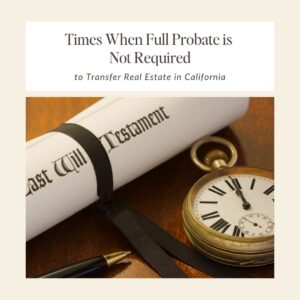Times When Full Probate is Not Required to Transfer Real Estate in California

As a real estate agent in California, a common question I get after the owner passes is: “Does the house need to go through probate before we can sell it?”
The answer depends on how title was held. Let me walk through the various scenarios in a general way so that you understand the basics.
Although I have helped many people with the sale of an inherited home as part of a trust or probate, I’m not an attorney or a tax specialist, so for your more specific questions regarding your particular situation you should reach out to those professionals. Now, let’s take an overview look at some of the exemptions to Probate and how they relate to real estate…
First, look at the grant deed to see how title was vested (held) – this tells you if probate is needed in order to sell. I’m able to contact the title company and obtain a copy of the deed for my clients. Please reach out if you need a copy to determine how title is held. I’m happy to get that document for you.
If the house was in a Living Trust, no probate is required. The trust owns the property, not the deceased individual. Get a copy of the trust to identify the successor trustee, who can hire an agent and authorize the sale. Having real estate held in this way is very favorable and appreciated by the heirs. It cuts down on the timeline, fees, and red tape of selling real estate after the owner passes. If you own real estate and have not looked into a plan for when you pass, I urge you to meet with an Estate Planning attorney and consider putting your real estate assets into a living trust. If you need a referral to an attorney, please reach out at rachel@YourNextCAhome.com.
If title was in Joint Tenancy, it depends if all joint tenants passed away. If one remains alive, no probate – record an affidavit of death and death certificate of the deceased tenant. But later when the last tenant dies, probate will be needed.
For Community Property, title passes to the surviving spouse unless the deceased spouse willed their 50% share to someone else. In that case, with an estate over $184,500, probate would likely be required to transfer the willed half.
However, in practice, if the Surviving Spouse sells the real estate, title companies often just have the other heirs sign off without probate. Still, the surviving spouse may need a court order due to the deceased spouse’s power to will their 50% away.
For community property with Right of Survivorship, the surviving spouse automatically inherits the house. But when the last spouse dies, probate will be necessary.
With a Revocable Transfer On Death deed, the beneficiary automatically inherits the house without probate. But this method now only applies to residences under a certain size.
If a spouse died intestate (without a will), the surviving spouse can file a Spousal Property Petition to receive the house without a full probate. This typically takes 3-4 months.
A similar petition called a Heggstad Petition can put a home back into a trust if it was left out accidentally. Success of this petition depends on the specific facts.
If the property value is under $184,500, an affidavit or succession petition may allow sale without probate. But specific rules apply in those situations.
I hope this has helped shed some light on the exemptions to Probate and how it relates to real estate. Let me know if you have any other probate real estate questions. I’m here to discuss this difficult subject and if necessary, assist you with selling an inherited property or home.
Hello!
I'm Rachel & I help people at all levels, from First Time Buyers, to those Buying & Selling Luxury Estates.
For those who have a Home to Sell, including Inherited homes, I have extensive experience to make the process fast and easy. Let me know how I can help you with your unique situation.
Inherited Home
Sell With Ease
Client Success Stories
All Articles
SCHEDULE YOUR FREE CONSULTATION